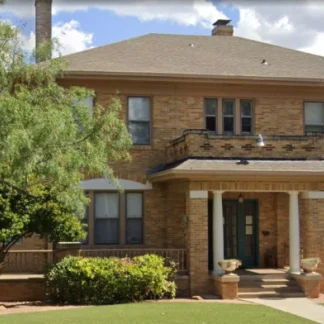AA - Alcoholics Anonymous - Mid Town Group
AA – Alcoholics Anonymous – Mid Town Group is a non-profit rehab located in San ...
Sara’s House provides addiction treatment to women in San Angelo, Texas. Their services cater to the unique needs and challenges the female population faces that can lead to substance abuse and mental health conditions.
The residential program at Sara’s House is for women who need a high level of support and who need to be removed from their home environment in order for treatment to be effective. As a gender-specific program, women’s issues are discussed in a safe space without the distractions of the opposite gender. Individual therapy, group therapy, family therapy, and psychoeducational classes are offered. Upon completion of the stay, women may be referred to one of ADACCV’s outpatient programs or to an outside aftercare program in order to continue treatment.
Aftercare programming is for individuals who have successfully gone through a residential or inpatient treatment program, but who still desire continual support. These programs often include alumni groups, group therapy, 12 Step meetings, SMART meetings, and individual therapy. The purpose is to provide a safe space to continuously work on recovery and to connect with others also in recovery.
Contact us for more information: (325) 655-7777

Connect with ADACCV - Sara's House by calling their admissions team directly.
(325) 655-7777 Website Get DirectionsResearch clearly demonstrates that recovery is far more successful and sustainable when loved ones like family members participate in rehab and substance abuse treatment. Genetic factors may be at play when it comes to drug and alcohol addiction, as well as mental health issues. Family dynamics often play a critical role in addiction triggers, and if properly educated, family members can be a strong source of support when it comes to rehabilitation.
Group therapy is any therapeutic work that happens in a group (not one-on-one). There are a number of different group therapy modalities, including support groups, experiential therapy, psycho-education, and more. Group therapy involves treatment as well as processing interaction between group members.
In individual therapy, a patient meets one-on-one with a trained psychologist or counselor. Therapy is a pivotal part of effective substance abuse treatment, as it often covers root causes of addiction, including challenges faced by the patient in their social, family, and work/school life.
Life skills trainings involve all the skills a person must have in order to function successfully in the world. These include time management, career guidance, money management, and effective communication. Truly successful addiction recovery is based on the ability to not only live substance-free, but to thrive. Life skills teaches the practical necessities of functioning in society, which sets clients up for success in life, and therefore sobriety.
Group therapy is any therapeutic work that happens in a group (not one-on-one). There are a number of different group therapy modalities, including support groups, experiential therapy, psycho-education, and more. Group therapy involves treatment as well as processing interaction between group members.
In individual therapy, a patient meets one-on-one with a trained psychologist or counselor. Therapy is a pivotal part of effective substance abuse treatment, as it often covers root causes of addiction, including challenges faced by the patient in their social, family, and work/school life.
Life skills trainings involve all the skills a person must have in order to function successfully in the world. These include time management, career guidance, money management, and effective communication. Truly successful addiction recovery is based on the ability to not only live substance-free, but to thrive. Life skills teaches the practical necessities of functioning in society, which sets clients up for success in life, and therefore sobriety.
In individual therapy, a patient meets one-on-one with a trained psychologist or counselor. Therapy is a pivotal part of effective substance abuse treatment, as it often covers root causes of addiction, including challenges faced by the patient in their social, family, and work/school life.
Life skills trainings involve all the skills a person must have in order to function successfully in the world. These include time management, career guidance, money management, and effective communication. Truly successful addiction recovery is based on the ability to not only live substance-free, but to thrive. Life skills teaches the practical necessities of functioning in society, which sets clients up for success in life, and therefore sobriety.
Life skills trainings involve all the skills a person must have in order to function successfully in the world. These include time management, career guidance, money management, and effective communication. Truly successful addiction recovery is based on the ability to not only live substance-free, but to thrive. Life skills teaches the practical necessities of functioning in society, which sets clients up for success in life, and therefore sobriety.
AA – Alcoholics Anonymous – Mid Town Group is a non-profit rehab located in San ...
West Texas Counseling and Rehabilitation Program is a private rehab located in S...
Shannon Medical Center–Behavioral Health, in San Angelo, Texas, provides psychia...
MHMR Services for the Concho Valley is a public rehab located in San Angelo, Tex...